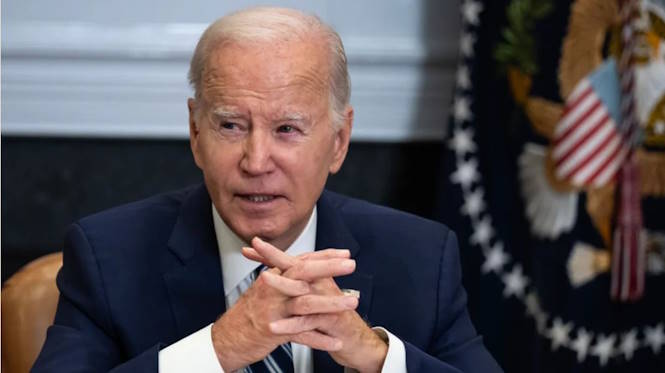
Photo by Drew Angerer/Getty Images
Biden has until March 19 to drop out
By Paul Bedard
In late 1995, Republican presidential candidate Steve Forbes had a problem. Instead of pulling out his checkbook and paying to get on state primary ballots, he chose to do it the old-fashioned way and get thousands of signatures on petitions, and it wasn’t going well.
As the deadline for the petitions in Rhode Island neared, staffer Doug Heye and two others headed to the Ocean State to finish the job.
“Now I’ve never been to Rhode Island before. There’s a foot of snow on the ground. And we’re, like, what do we do? The malls were empty the week before Christmas. I called back to the home office and said we’re not getting this done. This is not happening. You got to do something else,” Heye recalled.
But it was too late. Forbes did not appear on the GOP primary ballot and eventually pulled out of the race won by then-Sen. Bob Dole.
Heye recalled that panicked weekend to throw cold water on talk of challengers to President Joe Biden and former President Donald Trump getting into the primaries. “They’re just too late,” he said, noting that most state ballot access deadlines have passed.
“Barring an act of God, it’s going to be Trump versus Biden,” said Matt Gorman, a political consultant and vice president at Washington-based Targeted Victory.
In fact, on March 19, it’s likely that Biden will have the delegates needed to win, and Trump won’t be far behind.
And just as importantly, after the five primaries that take place on March 19, it will also be too late for Biden or Trump to get out of the race since many states require their delegates to vote for the candidates they are committed to on convention first ballots.
“I think he has to make that decision by the 19th himself,” said Trey Trainor, one of six commissioners on the Federal Election Commission and a former FEC chairman.
“If he hasn’t made it by then,” Trainor added, “all of these other things kick in. You get bound delegates. You get him having enough delegates on the first vote that the super delegates can’t vote. You get state laws that now are requiring him, because he’s got enough votes, to be the nominee.”
Lee Goodman, an elections attorney and former FEC chairman, said: “As a practical matter and a legal matter, the nomination processes of both parties are too far along for new candidates to enter the contest and win a sufficient number of ballots.”
The calendar math is also closing on groups like No Labels that think they can jump in and run an independent campaign, possibly headed by Sen. Mitt Romney (R-UT) or Sen. Joe Manchin (D-WV) or even former U.S. Ambassador to the United Nations Nikki Haley.
According to one report, No Labels is on the ballots of 13 states that only make up 113 electoral votes when 270 are needed to win. And independent candidate Robert F. Kennedy Jr. is close to getting on the ballots of five states so far.
Trainor, who advised the 2012 Rick Perry for President campaign, said it takes unlimited resources to gain ballot access and that, even then, it hasn’t worked. “You look at the last legitimate third party candidate, Ross Perot (1992 and 1996), and he was able to get on the ballot because he had the crucial resources to be able to spend to do that, and it really does take a ton of money,” he said.
Wishing for a race other than Biden versus Trump, he said, “is pie in the sky thinking.”